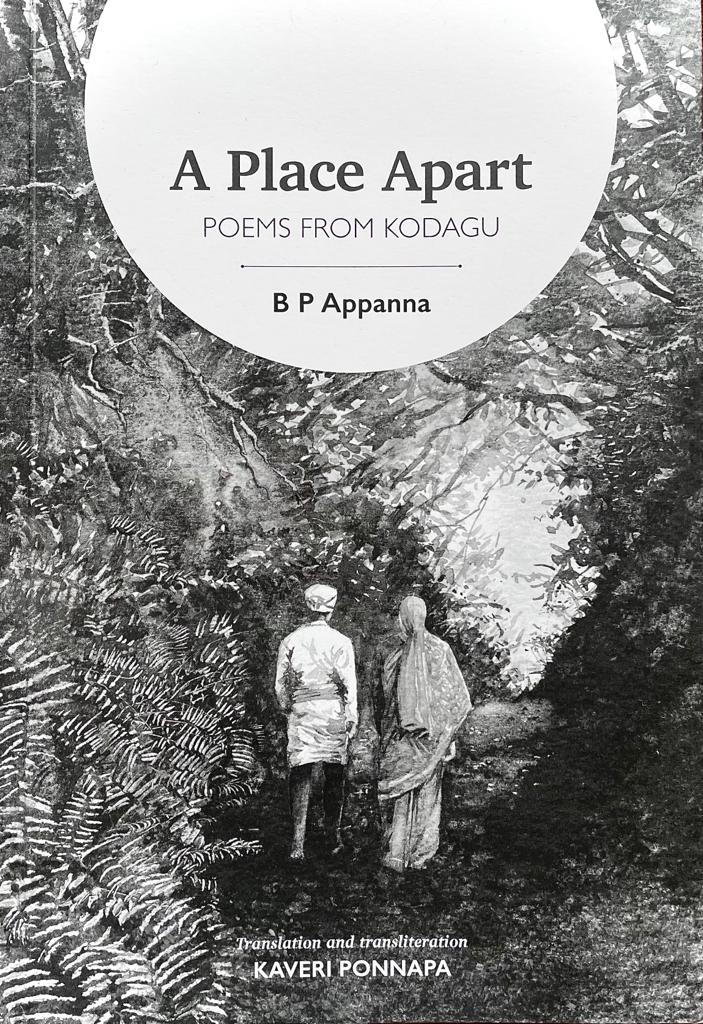Given the extremely good response to the felicitation article, CLN is taking the opportunity to showcase B P Appanna’s latest book A Place Apart.

A Place Apart Portrays the sense of dislocation and erosion of identity that the Kodava people have felt over the past decades. The magnificent landscape of Kodagu, which achieved mythical status in Kodava culture, forms the backdrop of Bacharanianda P.Appanna’s deceptively simple poems. The lines are layered with history, culture, myth, politics, and what it means to be a Kodava. In a rapidly homogenizing world, this collection of poems gives voice to one of the many small, distinctive societies that is on the brink of irretrievable cultural loss. Written in one of the UNESCO’s listed ‘definitely endangered’ languages of the world, this is the first time the poems have been translated into English.
Very few copies are left before it goes to reprint. A Place Apart can be ordered through Amazon at – https://www.amazon.in/Place-



It was a delight to work with Kaveri when she took the initiative to select, translate, transliterate and publish this book of poems. It is by far the best production of any of my writings.
Kaveri is a painstaking perfectionist in the way she combines fact based research and interpretation of data collected. Her lucid style is a gift that can be spotted in every line that she writes. The transliteration has set a new and easy standard for such work.
The professionalism standards that she follows is remarkable. She always gives credit to the source, even if she embellishes it with her hallmark style of writing. This is not necessarily the case with many writers, leaders and other researchers whom we share our knowledge and experiences with. My wife and I feel privileged to have made this exceptional relationship.
My name being reflected as the primary author is a reflection of her integrity and high standards. It should be made a textbook in all schools located in Kodagu and a must read for the diaspora.
I am Poet and have written prolifically in Tulu language on topics relating to Nature, Customs and Tulunad – published, televised primarily for a Tulu audience. Fortunately, we have a wide circle of kindred friends and a hugely supportive diaspora which encourages and motivates us to bring out quality productions.
I attended the Book Reading of A Place Apart at Bangalore International Centre where Kaveri Acca spoke about this delightful book of Kodava poems to a full audience. Well known Author Vivek Shanbagh and Dr Sayeegeetha from NITTE University were also present on the stage. We could immediately connect with Appanna’s poems – so well composed and enhanced by Kaveri’s translation and transliteration which made it accessible to a wider audience.
This is a fantastic effort made all the more enjoyable by her down-to-earth access. We remain good friends and all my group are now following her writings with great interest. Appanna and Kaveri have certainly elevated the stature of contemporary literary Kodava writings and made it accessible to the diaspora as well as a much wider audience. Every Kodava must purchase this book.
In the context of this felicitation, I am reproducing my comments about the extremely well written book of poems – A Place Apart.
The world of Kodavas, their unique worldview are captured in these poems. Bacharanianda P.Appanna’s love for his language and culture, his strong desire to preserve it for future generations is palpable in his writing. He has beautifully depicted the intricate relationship between nature and the inner life of the Kodavas. Kaveri Ponnapa’s translation has captured the immediacy and urgency of the voice in these poems.
I met Appanna Ajja and Ranu Acca recently at their residence in Kushalnagar. I would like to reproduce my comment regarding their book – A Place Apart, along with noted writer Mrs. Kaveri Ponnapa.
These poems are a chance to be an eyewitness and experience the Kodava world. Being a Dravidian language speaker, the rhymes and rhythm in the poems catch the reader’s mind. Layered with old words from the Kodava language, the English translation mirrors the poet’s thoughts. The transliteration adds a unique opportunity for English language readers to enter into the Kodava language. More of these presentations should be done in our languages.